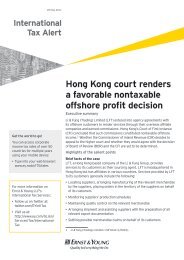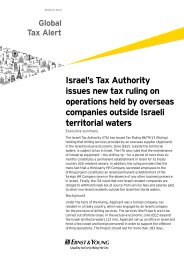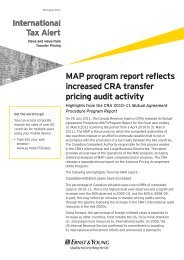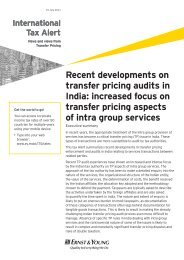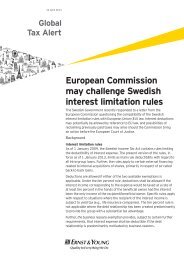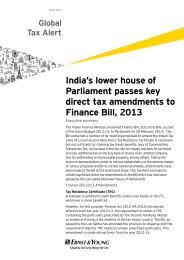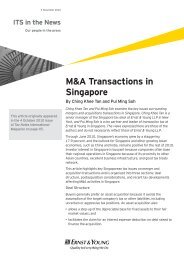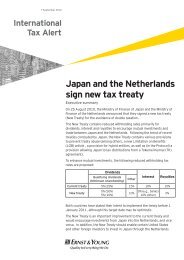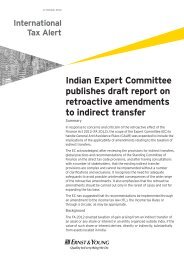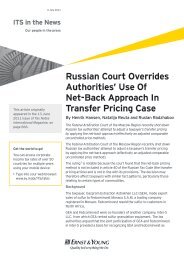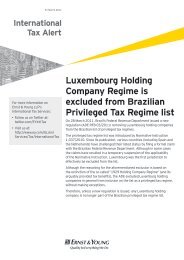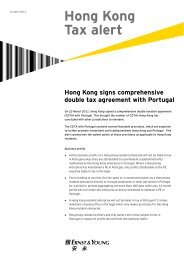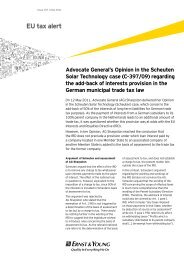A Breakthrough In The Relationship Between Italy's Tax Authorities ...
A Breakthrough In The Relationship Between Italy's Tax Authorities ...
A Breakthrough In The Relationship Between Italy's Tax Authorities ...
You also want an ePaper? Increase the reach of your titles
YUMPU automatically turns print PDFs into web optimized ePapers that Google loves.
This article originally<br />
appeared in the 31 October<br />
2011 issue of <strong>Tax</strong> Notes<br />
<strong>In</strong>ternational Magazine on<br />
page 367.<br />
Get the world to go!<br />
8 December 2011<br />
ITS in the News<br />
Our people in the press<br />
You can access corporate<br />
income tax rates of over 60<br />
countries for multiple years<br />
using your mobile device:<br />
• Type into your web browser:<br />
www.ey.mobi/ITS/rates<br />
News Analysis: A<br />
<strong>Breakthrough</strong> <strong>In</strong> <strong>The</strong><br />
<strong>Relationship</strong> <strong>Between</strong> Italy’s<br />
<strong>Tax</strong> <strong>Authorities</strong>, Banks<br />
By Emiliano Zanotti, Giovanni Ricco, Marco Ragusa and<br />
Antonfortunato Corneli<br />
A recent seminar on enhanced cooperation organized by the Italian<br />
Revenue Agency in conjunction with the Italian Banking Association, the<br />
Italian Association of Foreign Banks, and the OECD brought together more<br />
than 150 senior tax officials, bank tax directors, and banking association<br />
officials from around the world.<br />
More than 150 participants attending a seminar in Rome titled<br />
“Developing an Enhanced <strong>Relationship</strong> in the Banking Sector” October 10<br />
and 11 witnessed a historic moment in the Italian tax world.<br />
<strong>The</strong> seminar -- organized by the Italian Revenue Agency in conjunction<br />
with the Italian Banking Association (ABI), the Italian Association of<br />
Foreign Banks (AIBE), and the OECD -- brought together senior tax officials<br />
from a number of countries, the tax directors of Italian and foreign banks,<br />
and representatives of banking associations and the OECD.<br />
Discussions during the first two panels concerned the role of banks in<br />
the current economic environment, the impact of recent regulatory<br />
changes on tax matters, and the experience of various stakeholders with<br />
cooperative compliance programs. <strong>The</strong> subsequent three panels dealt with<br />
more technical tax issues, such as those related to bank losses and the<br />
criteria for attributing profits to the permanent establishments of banking<br />
companies.<br />
<strong>The</strong> director of the Italian Revenue Agency, opened the seminar, saying<br />
Italian tax authorities “will be very judicious in applying a zero-tolerance<br />
policy with reference to aggressive tax planning but will act with a great
sense of responsibility towards<br />
other kinds of planning and will<br />
provide taxpayers with a higher<br />
degree of certainty on tax matters.”<br />
Italian representatives said<br />
the Italian Revenue is ready to<br />
work with the ABI to develop a<br />
code of conduct and hinted that<br />
official guidance concerning the<br />
attribution of profits to PEs could<br />
be issued soon. Details of the panel<br />
discussions are included below.<br />
Developing the Enhanced<br />
<strong>Relationship</strong><br />
Panel 1 -- Setting the Ground<br />
<strong>In</strong> the first discussion, an<br />
OECD official said an enhanced<br />
relationship between tax authorities<br />
and taxpayers will naturally result<br />
in a win-win situation. When<br />
considering taxpayers’ obligation<br />
to pay taxes, he said, authorities<br />
should be mindful that taxation<br />
should not prevent economic<br />
growth. From that standpoint, it is<br />
questionable whether a new tax on<br />
financial transactions is needed in<br />
Italy, he concluded.<br />
A representative of the Italian<br />
Revenue’s Central Assessment<br />
Department said mutual trust<br />
is essential to an enhanced<br />
relationship between taxpayers and<br />
tax authorities. On the taxpayers’<br />
side, this would mean refraining<br />
from engaging in aggressive tax<br />
planning practices. On the side of<br />
the tax authorities, it would imply<br />
the determination of a clear line<br />
between legitimate and aggressive<br />
tax planning.<br />
A representative from the OECD’s<br />
<strong>In</strong>ternational Cooperation and <strong>Tax</strong><br />
Administration Division noted that<br />
the OECD has increased its focus<br />
on tax compliance, starting with<br />
the 2006 Seoul Declaration. That<br />
led to the 2008 “<strong>Tax</strong> <strong>In</strong>termediaries<br />
Study” and other OECD studies, 1<br />
he said. Chapter XI of the 2011<br />
OECD Guidelines for Multinational<br />
Enterprises recommends that<br />
multinationals “comply with both<br />
the letter and spirit of the tax laws<br />
and regulations” and “adopt tax<br />
risk management strategies” at the<br />
corporate board level, he added.<br />
<strong>The</strong> head of the tax department<br />
of an Italian banking group said<br />
tax directors should be involved in<br />
any process that is relevant for tax<br />
purposes (including the structuring<br />
of financial products) and should<br />
refrain from using aggressive tax<br />
planning schemes. <strong>Tax</strong> directors’<br />
compensation should not be linked<br />
to net results or tax savings, he<br />
said. <strong>Tax</strong> directors should also<br />
consider that disputes with tax<br />
authorities usually lead to a 50/50<br />
final result and, even in the event<br />
of a positive judicial outcome, that<br />
the reputational risk for banks is<br />
heavier than for other taxpayers, he<br />
said.<br />
Panel 2 -- Implementing the<br />
Enhanced <strong>Relationship</strong><br />
A tax manager at an Italian branch<br />
of a foreign bank explained how<br />
his bank is managing tax risks,<br />
1 Such as “Building Transparent <strong>Tax</strong><br />
Compliance by Banks” (2009),<br />
“Framework for a Voluntary Code<br />
of Conduct for Banks and Revenue<br />
Bodies” (2010), and “Addressing <strong>Tax</strong><br />
Risk <strong>In</strong>volving Bank Losses” (2010).<br />
2 ITS in the News Our people in the press<br />
with different tax service lines<br />
devoted to compliance, counsel,<br />
financial products and clients, and<br />
accounting and internal reporting.<br />
A tax risk approval process for new<br />
products is also in place, together<br />
with an operational risk committee.<br />
He asserted that large banking<br />
companies expect a fair approach<br />
by tax authorities, along with<br />
stable tax rules based on binding<br />
precedents, and nonretroactive<br />
changes in legislation.<br />
A representative from HM Revenue<br />
& Customs said that from U.K. tax<br />
authorities’ perspective, managing<br />
the tax risk associated with banks<br />
means dealing with:<br />
• the banks’ own tax planning;<br />
• schemes and shelters provided by<br />
the banks to their customers;<br />
• schemes and shelters financed by<br />
the banks; and<br />
• a lack of transparency in<br />
disclosing customer information.<br />
HMRC would expect an enhanced<br />
relationship to be based on<br />
full availability of information,<br />
transparency, trust, efficient tax<br />
administration, and day-to-day<br />
contact with the most senior bank<br />
personnel, he said.<br />
<strong>The</strong> vice president of another<br />
foreign bank confirmed that most of<br />
the results expected by both sides<br />
may be achieved through improved<br />
transparency. He added that the<br />
trend is clear to him: Transparency<br />
cannot be avoided, and it is only a
matter of how it is to be<br />
implemented (that is, whether it<br />
will be encouraged or imposed).<br />
Anyhow, in most cases,<br />
transparency will require a cultural<br />
change.<br />
Country Experiences and<br />
Technical Issues<br />
Panel 3 -- Codes of Conduct on<br />
<strong>Tax</strong> Practices<br />
An official from the South African<br />
Revenue Service (SARS) said that<br />
in 2009, SARS and the Banking<br />
Association of South Africa<br />
agreed that banks should avoid<br />
aggressive tax planning. <strong>The</strong>y also<br />
signed an agreement providing<br />
for constructive cooperation, a<br />
voluntary code of conduct, and the<br />
development of transparent and<br />
mutually trusting relationships. <strong>The</strong><br />
agreement is aimed at developing<br />
a common understanding of the<br />
banks’ business practices and the<br />
negative impact of aggressive tax<br />
planning, and effective remedies to<br />
such practices.<br />
Communication between the<br />
parties has significantly improved<br />
since the signing of the agreement,<br />
the SARS official said. <strong>In</strong> particular,<br />
relationship managers are now<br />
answering day-to-day inquiries,<br />
transactions allowing tax benefits<br />
are reported in real time, and a new<br />
advance tax ruling regime has been<br />
introduced. <strong>In</strong>dividual settlements<br />
with some banks have often<br />
resulted in a binding obligation on<br />
the taxpayer to cease tax practices<br />
that are considered to be abusive.<br />
A commissioner of the Spanish<br />
Revenue Service explained<br />
that the Spanish authorities<br />
implemented a code of conduct<br />
for large businesses in 2010 after<br />
developing relationships with large<br />
taxpayers over the previous six<br />
years. <strong>In</strong> particular, the Central<br />
Office for Large <strong>Tax</strong>payers was<br />
introduced in 2005 and a forum<br />
made up of Revenue officials<br />
and representatives of 27 large<br />
companies was set up in 2009.<br />
Under the code of conduct, the<br />
taxpayers committed to key<br />
involvement by their boards<br />
of directors and the avoidance<br />
of aggressive tax planning.<br />
<strong>The</strong> tax authorities committed<br />
to the publication of tax law<br />
interpretations and the answers<br />
to any question concerning the<br />
application of the tax rules. Both<br />
sides made a commitment to<br />
reduce tax litigation and to be more<br />
transparent and cooperative during<br />
tax audits.<br />
A representative of the London<br />
branch of a foreign bank discussed<br />
his bank’s decision to sign the<br />
U.K. Code of Practice on <strong>Tax</strong>ation.<br />
Based on his experience, he said,<br />
the decision was mainly driven by<br />
reasons such as:<br />
• keeping the bank’s classification<br />
as “low risk” after a positive 2007<br />
audit;<br />
• being consistent with a history<br />
of constructive engagement with<br />
HMRC; and<br />
• limiting inquiries and audits by<br />
HMRC, and having the authorities<br />
rely on the bank’s risk selfassessment<br />
and respective<br />
disclosures.<br />
ITS in the News Our people in the press<br />
<strong>In</strong>formal and real-time<br />
communication with the authorities<br />
improved significantly after the<br />
bank signed the code of practice, he<br />
said.<br />
Panel 4 -- <strong>The</strong> <strong>Tax</strong> Treatment of<br />
Bank Losses<br />
<strong>The</strong> head of the noncompliance unit<br />
of the OECD Centre for <strong>Tax</strong> Policy<br />
and Administration outlined the<br />
main features of the OECD Report<br />
“Addressing <strong>Tax</strong> Risks <strong>In</strong>volving<br />
Bank Losses” (2010). <strong>The</strong> report<br />
showed that banks incurred $ 1.3<br />
trillion in write-downs and losses up<br />
to January 2010 as an effect of the<br />
global financial crisis. Such losses<br />
represent a significant tax risk for<br />
both banks and tax authorities,<br />
particularly because existing rules<br />
on tax losses are complex, which in<br />
itself is a source of risk.<br />
<strong>The</strong> OECD speaker mentioned<br />
three main risk areas identified<br />
in the report: transfer pricing,<br />
corporate reorganizations, and<br />
derivatives and other complex<br />
financial instruments. He referred<br />
to a number of schemes relating<br />
to losses and highlighted the main<br />
conclusions and recommendations<br />
of the report.<br />
An official from the Austrian tax<br />
authority explained that Austrian<br />
rules on tax losses generally provide<br />
for an unlimited carryforward with<br />
some limitations in the event of a<br />
change in control or activity, losses<br />
of foreign subsidiaries, and other<br />
circumstances. <strong>The</strong> tax authority is<br />
concerned about the circumvention<br />
of those limitations, mainly through<br />
corporate reorganizations and<br />
inaccurate transfer pricing.<br />
3
Those practices are addressed<br />
mainly by tax audits and the<br />
creation of teams of tax auditors<br />
that specialize in bank audits,<br />
but also through advance rulings<br />
and enhanced dialogue with the<br />
taxpayers.<br />
<strong>The</strong> tax director of another Italian<br />
banking group identified banks’ key<br />
problems in dealing with tax losses,<br />
mentioning in particular increases<br />
of the effective tax rate and<br />
uncertainty about the future use of<br />
losses and the concept of “change<br />
of activity” when it may result in<br />
the forfeiture of the use of losses.<br />
He then mentioned key benefits<br />
that an enhanced relationship<br />
could bring in the area of losses,<br />
such as certainty over the use of<br />
losses in the future, the avoidance<br />
of aggressive tax planning by<br />
banks, and improved coordination<br />
between tax and regulatory rules.<br />
He concluded by describing recent<br />
changes to the Italian rules on loss<br />
carryforwards.<br />
Another ABI commissioner<br />
emphasized two good examples<br />
of the benefits of an enhanced<br />
relationship. <strong>The</strong> first example is<br />
legislation recently introduced by<br />
the Italian government to minimize<br />
the side effects of the losses<br />
incurred by banks. <strong>In</strong> particular, if<br />
a bank realizes a statutory book<br />
loss, then a percentage of the<br />
deferred tax assets (corresponding<br />
to nondeducted write-downs<br />
on loan receivables and future<br />
tax deductions of goodwill<br />
amortization) is converted into a tax<br />
credit that can be used to offset tax<br />
payable. This also positively affects<br />
the determination of the equity<br />
for regulatory purposes by way<br />
of the implementation of Basel III<br />
requirements.<br />
<strong>The</strong> second example addresses the<br />
tax uncertainty Italian banks were<br />
facing as a result of issuing certain<br />
hybrid instruments combining<br />
features of both debt and equity. A<br />
new provision allows the deduction<br />
of interest and equalizes the hybrid<br />
instruments to listed corporate and<br />
government bonds for withholding<br />
tax purposes.<br />
Panel 5 -- <strong>The</strong> Attribution of<br />
Profits to the PEs of Banks<br />
A representative of the Italian<br />
Revenue discussed Part II<br />
of the OECD “Report on the<br />
Attribution of Profits to Permanent<br />
Establishments.” He explained<br />
the two-step analysis contained in<br />
the report and illustrated some of<br />
the peculiarities of banking PEs,<br />
referring especially to the concept<br />
of key entrepreneurial risk-taking<br />
functions. He also addressed the<br />
issue of the allocation of free capital<br />
to an Italian PE of a nonresident<br />
bank and declared that the Italian<br />
Revenue is open to accepting<br />
all methods suggested by the<br />
OECD report on profit attribution,<br />
including the safe harbor approach.<br />
A transfer pricing specialist from<br />
HMRC illustrated the U.K. approach<br />
to the attribution of profits to<br />
banking PEs. He mentioned that<br />
the U.K. rules are in line with<br />
the authorized OECD approach<br />
(AOA) and explained how the<br />
U.K. generally applies the thin<br />
capitalization level to determine the<br />
level of free capital attributable to<br />
the PE.<br />
4 ITS in the News Our people in the press<br />
A representative of the U.S.<br />
Treasury Department then talked<br />
about the U.S. rules for the<br />
attribution of profits to PEs. He<br />
made it clear that the United States<br />
accepts the AOA for purposes<br />
of applying income tax treaties,<br />
but that a different set of rules<br />
applies under U.S. domestic law<br />
to determine the income that is<br />
effectively connected to a U.S. PE.<br />
He also mentioned that the United<br />
States has signed a number of<br />
income tax treaties that incorporate<br />
the principles of the AOA. He then<br />
identified some technicalities for<br />
the attribution of free capital to<br />
PEs, referring to the fact that the<br />
United States generally adopts a<br />
cleansed BIS ratio approach.<br />
An AIBE official outlined some of<br />
the issues banks face when dealing<br />
with the attribution of profits to<br />
PEs. <strong>The</strong> regulatory rules need to<br />
be taken into account, he said, and<br />
the determination of the amount<br />
of free capital to be allocated to<br />
PEs is often a contentious issue. He<br />
concluded by saying that foreign<br />
banks would welcome enhanced<br />
cooperation with the Italian tax<br />
authorities and are ready to work to<br />
ensure a level playing field.<br />
A Global Trend<br />
Many tax administrations have<br />
recently put into practice policies<br />
to enhance their relationships with<br />
banks. <strong>The</strong> seminar focused on<br />
the positive experiences carried<br />
out by specific countries that have<br />
already implemented a code of<br />
conduct for banking groups and<br />
other taxpayers. <strong>The</strong> adoption of<br />
such a code was shown to improve
the stability and understanding of<br />
the tax rules and to increase tax<br />
compliance.<br />
Our Take<br />
<strong>The</strong> seminar set expectations very<br />
high for enhanced relationships<br />
between tax authorities and<br />
taxpayers by presenting the<br />
experiences of the most advanced<br />
countries in this field.<br />
Italy does not have a long-standing<br />
tradition in this respect. However,<br />
things have improved with the<br />
recent establishment of the Large<br />
Business Office within the Revenue<br />
Agency and the associated tutoring<br />
and monitoring programs. A lot is<br />
still to be done and we look forward<br />
to seeing the code of<br />
For additional information with respect to this ITS in the News, please contact the following:<br />
Ernst & Young LLP, Italian <strong>Tax</strong> Desk, New York<br />
• Emiliano Zanotti +1 212 773 6516 emiliano.zanotti@ey.com<br />
Studio Legale Tributario, <strong>In</strong>ternational <strong>Tax</strong> Services, Milan<br />
• Marco Ragusa +39 02 851 4926 marco.ragusa@it.ey.com<br />
• Antonfortunato Corneli +39 02 851 4911 antonfortunato.corneli@it.ey.com<br />
Studio Legale Tributario, <strong>In</strong>ternational <strong>Tax</strong> Services, Rome<br />
• Giovanni Ricco +39 06 855 67 325 Giovanni.Ricco@it.ey.com<br />
ITS in the News Our people in the press<br />
conduct implemented by the Italian<br />
Revenue and analyzing its concrete<br />
application. Guidance on the<br />
attribution of profits to PEs would<br />
also provide additional clarity to the<br />
dialogue between tax authorities<br />
and businesses.<br />
5
Ernst & Young <strong>In</strong>ternational <strong>Tax</strong> Services<br />
• Global ITS, Jim Tobin<br />
• Americas, Jeffrey Michalak<br />
• Asia Pacific, Alice Chan<br />
• Europe, Middle East, <strong>In</strong>dia and Africa, Alex Postma<br />
• Japan, Kai Hielscher<br />
Ernst & Young Member Firm Contacts<br />
• Argentina Carlos Casanovas Buenos Aires<br />
• Australia Daryn Moore Sydney<br />
• Austria Roland Rief Vienna<br />
• Belgium Herwig Joosten Brussels<br />
• Brazil Gil Mendes Sao Paulo<br />
• Canada George Guedikian Toronto<br />
• Central America Rafael Sayagues San José<br />
• Chile Osiel Gonzalez Santiago<br />
• China Becky Lai Beijing<br />
• Colombia Ximena Zuluaga Bogota<br />
• Czech Republic Libor Frýzek Prague<br />
• Denmark Niels Josephsen Soborg<br />
• Finland Katri Nygård Helsinki<br />
• France Claire Acard Paris<br />
• Germany Stefan Koehler Frankfurt<br />
• Hong Kong Christian Pellone Hong Kong<br />
• Hungary Botond Rencz Budapest<br />
Balazs Szolgyemy Budapest<br />
• <strong>In</strong>dia Hitesh Sharma Mumbai<br />
• Ireland Joe Bollard Dublin<br />
• Israel Sharon Shulman Tel Aviv<br />
• Italy Marco Magenta Milan<br />
• Japan Kai Hielscher Tokyo<br />
• Korea Kyung-Tae Ko Seoul<br />
• Luxembourg Frank Muntendam Luxembourg<br />
• Malaysia Hock Khoon Lee Kuala Lumpur<br />
• Mexico Koen van ‘t Hek Mexico City<br />
• Middle East Tobias Lintvelt Abu Dhabi<br />
• Middle East Michelle Kotze Dubai<br />
• Netherlands Johan van den Bos Amsterdam<br />
• Norway Oyvind Hovland Oslo<br />
• Peru Roberto Cores Lima<br />
• Philippines Ma Fides Balili Makati City<br />
• Poland Andrzej Broda Warsaw<br />
• Portugal Antonio Neves Lisbon<br />
• Russia Vladimir Zheltonogov Moscow<br />
• Singapore Andy Baik Singapore<br />
• South Africa Justin Liebenberg Johannesburg<br />
• Spain Federico Linares Madrid<br />
• Sweden Erik Hultman Stockholm<br />
• Switzerland Daniel Gentsch Zurich<br />
• Taiwan Alice Chung Taipei<br />
• Thailand Anthony Loh Bangkok<br />
• Turkey Feridun Gungor Istanbul<br />
• United Kingdom Matthew Mealey London<br />
Anna Anthony London<br />
• United States Jeffrey Michalak Detroit<br />
• Venezuela Jose Velazquez Caracas<br />
• Vietnam Vu Huong Hanoi<br />
6 ITS in the News Our people in the press<br />
Ernst & Young<br />
Assurance | <strong>Tax</strong> | Transactions | Advisory<br />
About Ernst & Young<br />
Ernst & Young is a global leader in<br />
assurance, tax, transaction and advisory<br />
services. Worldwide, our 152,000 people<br />
are united by our shared values and an<br />
unwavering commitment to quality. We<br />
make a difference by helping our people,<br />
our clients and our wider communities<br />
achieve their potential.<br />
Ernst & Young refers to the global<br />
organization of member firms of<br />
Ernst & Young Global Limited, each of<br />
which is a separate legal entity.<br />
Ernst & Young Global Limited, a UK<br />
company limited by guarantee, does<br />
not provide services to clients. For more<br />
information about our organization, please<br />
visit www.ey.com.<br />
<strong>In</strong>ternational <strong>Tax</strong> Services<br />
About Ernst & Young’s <strong>In</strong>ternational <strong>Tax</strong><br />
Services practices<br />
Our dedicated international tax<br />
professionals assist our clients with their<br />
cross-border tax structuring, planning,<br />
reporting and risk management. We<br />
work with you to build proactive and<br />
truly integrated global tax strategies that<br />
address the tax risks of today’s businesses<br />
and achieve sustainable growth. It’s how<br />
Ernst & Young makes a difference.<br />
www.ey.com<br />
© 2011 EYGM Limited.<br />
All Rights Reserved.<br />
EYG no. CM2605<br />
This publication contains information in summary form<br />
and is therefore intended for general guidance only. It<br />
is not intended to be a substitute for detailed research<br />
or the exercise of professional judgment. Neither EYGM<br />
Limited nor any other member of the global Ernst &<br />
Young organization can accept any responsibility for<br />
loss occasioned to any person acting or refraining from<br />
action as a result of any material in this publication. On<br />
any specific matter, reference should be made to the<br />
appropriate advisor.



